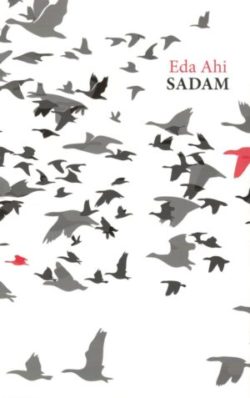Eda Ahi. Sadam (Harbor)
Tallinn, Verb, 2017. 48 pp
ISBN 9789949984152
Eda Ahi is a self-standing great of contemporary Estonian poetry. Admittedly, the average Estonian reader (and most amateur poets) still views poetry as something put to rhyme and rhythm; as tied to speech. Ahi does also write that kind of poetry, but she’s rather alone in riding the wave. She is perhaps comparable only to today’s rappers and hip-hop poetry, the form of which generally requires rhyme and rhythm. Yet, Ahi’s genetic descent is from highbrow poesy, and her debut, the award-winning collection Masquerade (Maskiball, 2012), has been likened to Betti Alver’s style. Masquerade was followed by the restless winds of Ahi’s Gravity (Gravitatsioon, 2013) and Security (Julgeolek, 2014).
Then, Ahi displayed her strong linguistic talent and knack for rhyme, flirting with “great Russian poetry” and making references to Estonian poetry history (while simultaneously showing a sense of self-irony), as well as concealing autobiographical elements in poetic word play.
Harbor is Ahi’s best collection to date. It creates a somewhat mild world: the atmosphere of an old wooden residential neighborhood near the downtown. But it also feels like there is more darkness than before. Pretty metaphors are smeared and broken: “I dwell not in the same disquiet, / although I still now find lands / that are sad that are shattered / in whose breast pocket mines sprout / into towering stalks of death’s disquiet” (“Hackberry”, p 16). In some sense, one could say that Ahi’s more masculine side pushes forth in the new collection – coming off as stronger, more decisive, more determinant, more longing, and more ready to walk out as the lover in a relationship, but also much more clearly bohemian. The voice of Ahi’s protagonist is more of a trickster, but also more melancholic than before.
Ahi’s metaphors also seem moodier and more shifting than in earlier collections: “you light matches in the wind. / but acorns sprout in your pocket.” (“Harbor”, p 8), and “light the match fast / to dispel the smell of death.” (“Foaming”, p 12). Ahi writes what is personal with bold, sweeping generalization – it becomes poetry, not a realist’s recording. She’s sometimes cold, but sometimes very warm. Occasionally, she finds a way to use the style as a kind of willful confession: “there’s no escaping your native climate. // I’ve made honest choices. I’ve made a distinction. glaring mistakes. / disheartened quite a lot of men. / disheartened the only right man. / — any regrets? probably just that last.” (“Inventory”, p 19).
Yes, Harbor has its fair share of romantic poetry that is passionate and scornful – acknowledging its own intensity and lust, only to ridicule it on the very next page and resuming its freedom game. Some sections converse with earlier poetry by Kristiina Ehin (such as Ehin’s Spring in Astrakhan, 1999): there is a degree of macaronics; there is lithe and girlish teasing. Sometimes, I feel like I can recognize my whole life in Ahi’s poems: “it’s hard to speak. / there’s rasping in my throat. / there’s still the taste of yesterday’s words in my mouth” (p 9). At the same time, Eda Ahi is larger than life. She writes about our era, herself, and love, and in doing so, she plays with them just like she does with poetry: gracefully. Almost effortlessly. And then, you find lines that cause pain; and then, there are lines that appear hidden in a deck of cards.
Jürgen Rooste (1979) is a poet, journalist, and one of the most renowned Estonian writers of his generation. He has published fifteen poetry collections and received the Cultural Endowment of Estonia’s Award for Poetry on two occasions, among many other literary awards.


